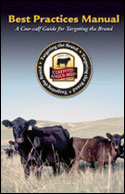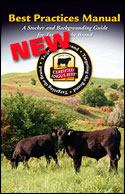Custom Mix
When should producers consider a customized mineral supplement?
Typically, the local feed supplier stocks one or more brands of mineral supplement for cattle on forage diets. These products generally contain predetermined amounts of the dietary mineral elements most classes of cattle require for normal body maintenance, growth and reproduction. In most cases, producers can find satisfactory supplements among the ample number of commercially available products produced by reputable companies.

However, because forage nutrient profiles vary, specific mineral needs also vary by region, and among different operations. Mass-produced commercial supplements may not always supply appropriate amounts of certain minerals. In such instances, a custom-mixed supplement can be formulated to provide proper levels of minerals, based on analysis of cattle diet.
According to University of Arkansas ruminant nutritionist Shane Gadberry, by analyzing forages and mineral content of the water supply, producers can find where the diet fails to meet or exceeds requirements for specific minerals. Studying the "guaranteed analysis" of available commercial supplements will reveal whether they are suitable or a customized supplement warrants consideration.
Gadberry recommends careful attention to micro- or trace minerals. Just because they are needed in smaller amounts doesn't mean they are less important than macro-minerals.
"Custom formulation has the advantage of fine-tuning a mix for intake, ingredient selection, and composition," Gadberry says. "For example, a producer that was having problems with grass tetany used a custom mineral to get a higher magnesium content. Ten percent magnesium is a common over-the-counter level. Either mineral intake or lack of enough magnesium was causing his herd to continue to develop grass tetany with a 'high-mag' mineral. He went up to 14% in the custom blend and has not had a problem. Once again, this could also be an intake difference where the custom mineral, despite the higher magnesium, may have been more palatable across the herd and afforded better consumption."
Gadberry says one of the challenges producers report with commercial minerals is over-consumption. It gets expensive, when a free-choice mineral product says cattle need 3 to 4 ounces daily, but they are consuming twice that much. Producers often can control consumption levels by mixing the mineral supplement with salt, but a customized mineral mix may be a cost-effective way to control intake.
Customized mineral mixes often are less expensive than commercial minerals, but suppliers typically require a minimum purchase of 3 to 4 tons. According to Gadberry, that often limits the use of custom mixes to larger operations.
Even if a small operator is willing to lay out the cash and stock up on a customized mineral supplement, it may not be practical. Vitamins contained in supplements can break down in the presence of minerals, so producers probably shouldn't inventory products for more than a few months.
There are instances, Gadberry adds, where operations within the same local area can use the same custom mineral supplement. Producers may be able to share in a cost advantage by cooperating on the volume-purchase of mineral supplements.
[Click here to go to the top of the page.]





